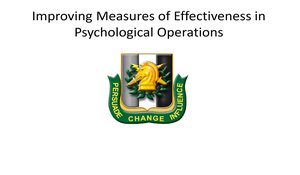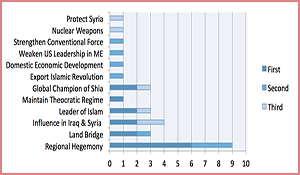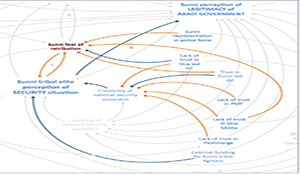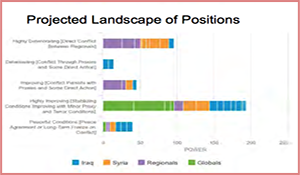
Commercial Companies’ Perceptions of Security Space
[Q6] How do commercial ventures think about the security of their space assets during peacetime, crisis and conflict? Do industry leaders think about warfare in or through space differently than military leaders? What are their main concerns? How reliant are they on governments for warning or protection of space? What are their threat priorities? Author(s): […]
Continue Reading
Pre-Space Age Approaches to Military Capabilities
[Q15] What insight on current space operations can we gain from understanding the approaches used for surveillance, reconnaissance, navigation, communication, timing synchronization, and indications and warnings before the advent of the space age? Author(s): George Popp (NSI, Inc.) Summary Response This report summarizes the input of 13 insightful responses contributed by space experts from National […]
Continue Reading
Improving Measures of Effectiveness in Psychological Operations
Improving Measures of Effectiveness in Psychological Operations Speakers: McQuagge, E. (Northrop Grumman) Date: 8 March 2018 Speaker Session Preview Abstract: One of the most vital aspects of Military Information Support Operations is the measure of effectiveness of the series. It represents the MISO unit’s ability to justify its skillset and contribution as a warfighting function. […]
Continue ReadingEvolving Human and Machine Interdependence in Conflict
Evolving Human and Machine Interdependence in Conflict Speakers: Burnett, R.E. (National Defense University) Date: 6 March 2018 Speaker Session Preview Abstract: Emerging science and technology will continue to disrupt customary characteristics of political and kinetic conflicts among states and non-state actors. The increasing complex interdependence between humans and machines is one area for particular examination. […]
Continue Reading
Prioritized Iranian Interests in the Middle East
Question (R6.9): How does Iran prioritize its influence and presence in the region? Author | Editor: Canna, S. (NSI, Inc). Executive Summary Hoping to answer the question of how Iran prioritizes its influence and presence in the Middle East, we asked fifteen experts to list—in rank order—Iran’s key interests, how it seeks to realize those […]
Continue ReadingCounter-Messaging to Prevent Radicalization
Question (R6.4): Knowing that religion is only one (and not the most important) stimulus for disgruntled Islamic youth to join VEOs, what could/should be the domestic messaging to youth to prevent their “radicalization” and joining the VEOs? To what extent could a continued presence of Western military in the Middle East (even only as instructors/trainers) […]
Continue ReadingIraq: Coalition or Bilateral Approach?
Question (R6.3): What is most favorable for the stability and the future of Iraq after the defeat of Da’esh: continued presence of an international Coalition or normal state-to-state bilateral relations? If a Coalition is the preferred option, what could be the “unifying factor” for a post-OIR coalition in Iraq and what situations could exist/emerge to […]
Continue ReadingNew Iran Strategy
Question (R6.6): How does USCENTCOM, working within a whole of government approach, coordinate military operations in support of the change in approach towards Iran from the previous to the current administration? Author | Editor: Jafri, A. (NSI, Inc). Executive Summary As battlefield successes actualize, decision makers have an opportunity to align tactical and operational policies […]
Continue Reading
Building Partner Capacity: Iraq
Question (R6.10): What can the U.S. and Coalition partners realistically do to enable Iraqi Security Forces (ISF) to combat a long-term ISIS insurgency? Recognizing the enormous resources the U.S. poured into the ISF from 2003 until 2011, only to see much of the force collapse in 2014, what can we do to avoid making the […]
Continue Reading
Denying the Seeds of Future Conflict
Question (R6.1): What conditions (demographic, political, etc.) should exist on the ground in the Middle Euphrates River Valley and the tri border (Syria/Jordan/Iraq) region to deny the seeds of future conflict from being planted – particularly taking into account the assumed intention of Iranian proxy forces to establish a Shia “land bridge?” Which of these […]
Continue Reading